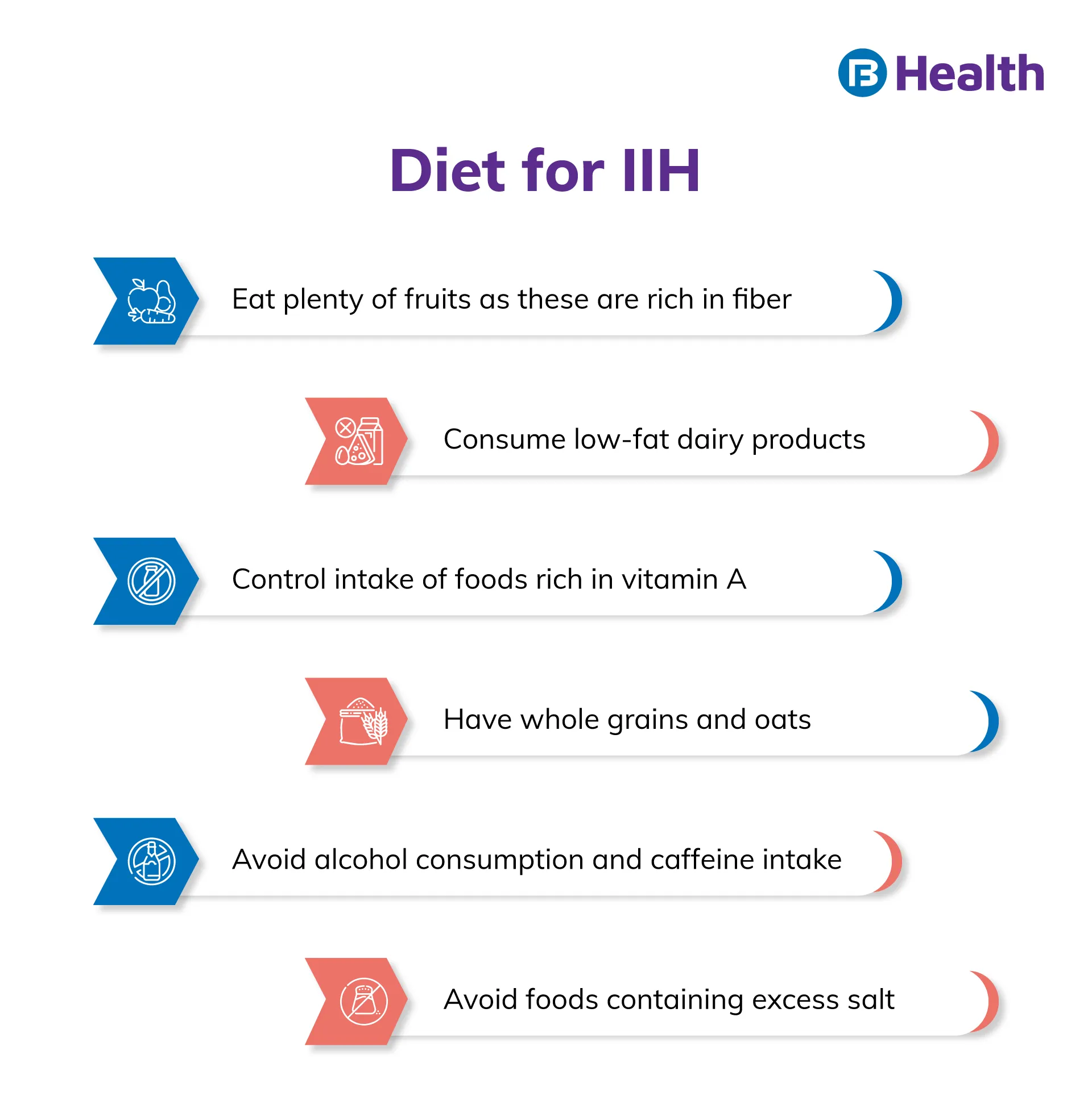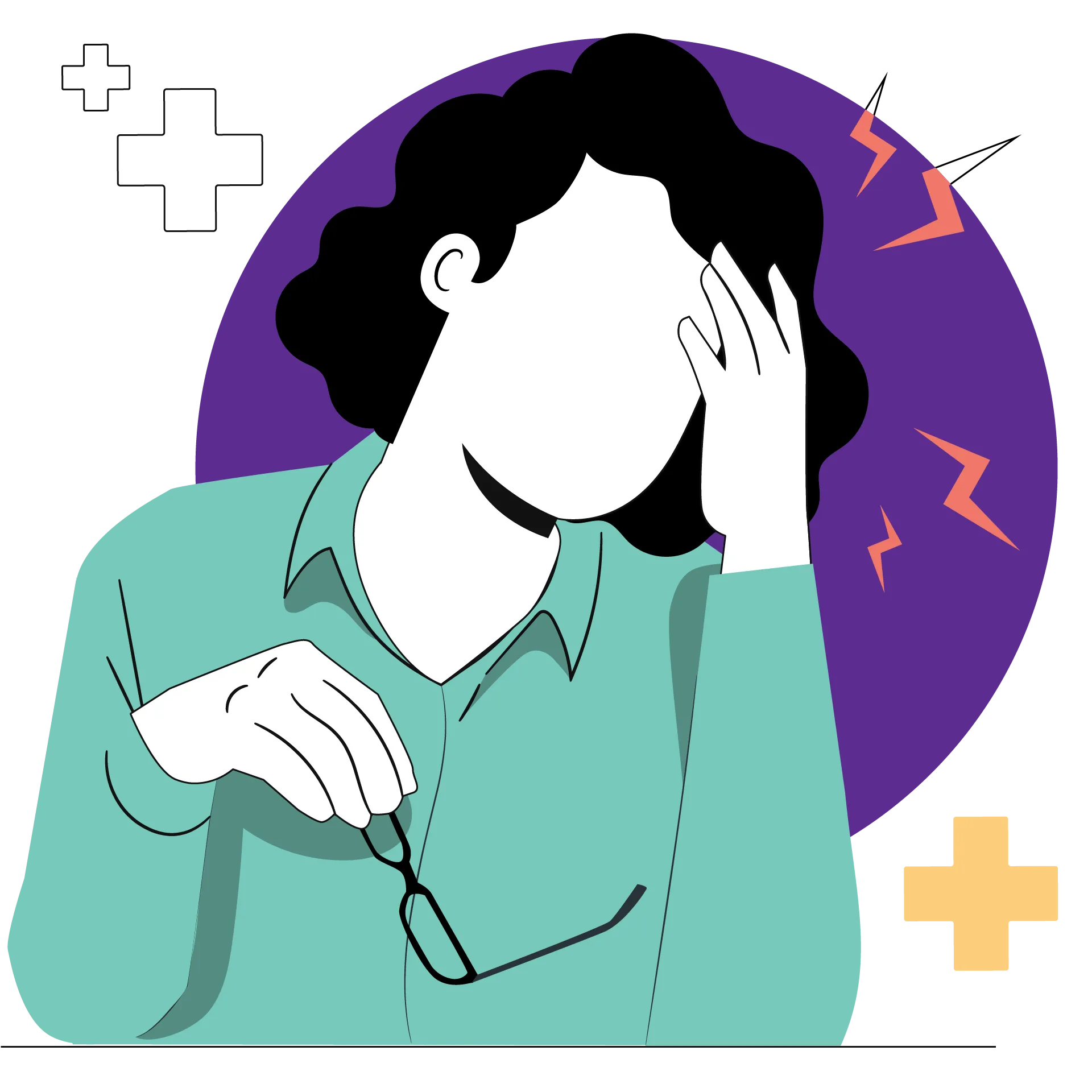Hypertension | 7 min read
Idiopathic Intracranial Hypertension: Causes, Risks and Treatment
Medically reviewed by
Table of Content
Key Takeaways
- Intracranial hypertension causes a sudden and severe headache
- There are primary and secondary intracranial hypertension stages
- Vomiting, peripheral vision loss, and fatigue are a few IIH symptoms
A condition in which the pressure in your skull increases is known as idiopathic intracranial hypertension (IIH). This condition occurs when there is a build-up of cerebrospinal fluid around your brain. When this fluid builds up, it can increase the pressure on your optic nerves. These nerves are responsible for your vision. IIH can cause changes in your vision, headaches or even temporary blindness.
The shocking fact is that symptoms of this condition mimic brain tumor symptoms. While medications can reduce IIH symptoms, in extreme cases, you may have to undergo surgery. Though this condition occurs both in adults and children, obese women of reproductive age are more susceptible [1]. Read on to learn more facts about intracranial hypertension.
What is IIH?
Before learning about IIH, it is important to have an answer to the question ‘what is hypertension?’ When blood pressure increases above normal values, it is known as hypertension. If not checked on time, this condition can affect your kidneys, heart, and brain. According to WHO, approximately 1.28 billion individuals are suffering from hypertension [2]. There are two main types of hypertension such as [3]:
- Primary, which is the most common type
- Secondary, which is caused due to existing medical conditions
If you are wondering how to manage hypertension, all you need to do is follow certain precautionary measures. These are as follows:
- Reduce the amount of salt you consume
- Minimize alcohol intake
- Exercise regularly
- Eat plenty of fruits and vegetables
- Avoid food for high BP so that your BP level does not increase
Idiopathic means there is no definite cause. When high pressure develops in your skull, it results in (IIH) idiopathic intracranial hypertension. Similar to hypertension, there are two intracranial hypertension stages too that include primary and secondary stages.

Who Are At Risk of IIH?
Women are at higher risk of developing IIH conditions compared to men. Research has shown that out of 20, 19 people diagnosed with this disease are women. They are aged between 20 to 50. [1] Certain conditions that up your risk of IIH are as follows:
- If you are an overweight person and your BMI is more than 30
- If you are dealing with chronic kidney illness
- If you are already suffering from hormone-related diseases such as hyperthyroidism or hypothyroidism and Cushing’s syndrome, which refers to a condition when your body makes excessive amounts of cortisol or stress hormone
- If you are suffering from anaemia or iron deficiency in the body
- Lupus, a type of autoimmune disease
- Polycythaemia vera is when you have an abnormal amount of red blood cells in the body
Other Conditions
- If you are suffering from chronic kidney disease
- Your body mass index increases beyond 30
- You are anemic
- If you have thyroid conditions like hyperthyroidism and hypothyroidism
- You have excess red blood cells in your body
Medications that Can Cause IIH
Idiopathic Intracranial Hypertension is an underlying medical condition that affects women more than men. Children before puberty can also suffer from it. However, it is uncommon in infants.
It is difficult to pinpoint the causes of Idiopathic Intracranial Hypertension. The word ‘Idiopathic’ itself means unknown. However, the consumption of some medicines is shown to induce Idiopathic Intracranial Hypertension. [2] Listed below are such medicines:
- Certain drugs that contain Vitamin A, such as cis-retinoic acid (Accutane)
- Amiodarone
- Cyclosporine
- Cytarabine
- Growth hormone
- Lithium carbonate
- Nalidixic acid
- Nitrofurantoin
- During the consumption as well as when you cease to consume steroids
- Birth control pills such as levonorgestrel
- Levothyroxine (children)
- Isotretinoin
- Phenytoin
- Minocycline
- Tamoxifen
- Tetracycline
Aside from this, other health conditions can also lead to Idiopathic Intracranial Hypertension. Some people suffer it for a long period due to various underlying health conditions such as blood clots or brain tumours. Sometimes it suddenly occurs because of the deposition of pus and swelling in the brain, trauma from a head injury, or stroke. Children who have down syndrome are more likely to suffer from it.
What Causes Idiopathic Intracranial Hypertension?
IIH may occur due to preexisting conditions like blood clots or a tumor in the brain. In a sudden episode of IIH, these are a few possible causes such as:
- Stroke
- Pus accumulation in the brain
- Swelling in your brain
- Head injury
How Can IIH Symptoms Affect You?
One of the most prominent symptoms of IIH is the onset of a severe and sudden headache. It can be so painful that your sleep can get affected. There may be vision problems as well. Some of the other signs of IIH include:
- Nausea
- Peripheral vision loss
- Vomiting
- Fatigue
- Headaches
- Ringing noise in the ears
- Pain in your shoulder and neck
Diagnosis
Just like a BP test that can diagnose hypertension, you can diagnose IIH with the help of the following tests:
- Eye examination to check if there is any swelling near optic nerves
- Visual field test to determine if there are any blind spots in the vision
- Lumbar puncture to check the level of cerebrospinal fluid
- MRI scan
- CT scan of the brain
- Tests to check if your muscle strength and reflexes are working properly
IIH symptoms can be improved with proper management. If your BMI levels are high, reducing your weight may help in treating symptoms. You may be prescribed certain medications by your doctor to minimize the production of CSF. Certain pills may also help in decreasing fluid retention. In cases where there are severe IIH symptoms, you may need to undergo surgery. The surgery involves the placement of a spinal fluid shunt for draining excess CSF formed in the brain. While there are ayurvedic medicine for BP, it is not sure if there are any for IIH.
Idiopathic Intracranial Hypertension Treatment
In some cases, intracranial hypertension symptoms go away on their own. If it persists, the doctor may opt for the following treatment methods.
Shed Extra Weight
When your BMI is high, the doctor will recommend you lose weight to minimize the IIH symptoms. A 5% to 10% of losing your body mass will prove helpful in this regard.
Treatment With Medicine
Some medicines are known to improve IIH symptoms. Your healthcare provider will offer medicines allowing your body to produce less CSF. Some fluid retention medicines will also be given to decrease the number of fluids.
Surgery
When symptoms become severe, you will require to undergo surgery. Your doctor may recommend procedures to drain the excess fluid from your brain. It includes a spinal fluid shunt and an eye surgery called optic nerve sheath fenestration to improve the condition.
What Mimics Idiopathic Intracranial Hypertension?
Some other existing health conditions could also cause similar symptoms. Therefore, they are mistaken for intracranial hypertension.
Arachnoiditis
When the surrounding spinal cord membranes get inflamed due to bacterial infection or some chemical reactions
Brain Tumours
Growth of abnormal cells in the brain tissues, cancerous or on cancerous
Epidiorites
This is a type of infection that occurs between the skull bones and the outer lining of your brain
Meningitis
When the protective membranes of the brain and the spinal cord get inflamed due to viral or bacterial infection
Additional Read: Ayurvedic Medicine for High BPNow that you have a better understanding of idiopathic intracranial hypertension, you must visit your doctor the moment you notice any symptoms. If left untreated, it can cause permanent vision loss too. For any health issues, you can connect to top neurologists on Bajaj Finserv Health. Book an online doctor consultation and address your symptoms from the comfort of your home itself!
References
- https://www.ncbi.nlm.nih.gov/pmc/articles/PMC4916517/
- https://www.who.int/news-room/fact-sheets/detail/hypertension
- https://medlineplus.gov/highbloodpressure.html
Disclaimer
Please note that this article is solely meant for informational purposes and Bajaj Finserv Health Limited (“BFHL”) does not shoulder any responsibility of the views/advice/information expressed/given by the writer/reviewer/originator. This article should not be considered as a substitute for any medical advice, diagnosis or treatment. Always consult with your trusted physician/qualified healthcare professional to evaluate your medical condition. The above article has been reviewed by a qualified doctor and BFHL is not responsible for any damages for any information or services provided by any third party.






